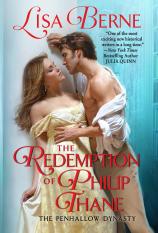Reading Group Guide
Discussion Questions
The Redemption of Philip Thane: The Penhallow Dynasty

1. Do you think Philip Thane deserves to be trapped in the same day over and over again? In other words, has he brought it upon himself by his prior actions and behavior?
2. In the end, why do you think he’s freed from what initially feels like a curse?
3. As the story progresses, Margaret seems to continually sense some aspects of the ever-repeating day, although no one else around her does. Why do you suppose that is?
4. Do you believe that mystical events can, and do, happen in real life?
5. What would you do if you had to repeatedly live the same day? Is there a particular day in your life you would choose? Are there things you’d do again? Or differently? What new things might you try?
6. In Chapter 15, Philip says, “Whenever we read a book again, it’s a different experience, don’t you think? The book hasn’t changed, but we have.” Margaret then describes a book she read as a girl and loved but that falls rather flat for her as an adult. Have you had this experience yourself as a reader?
Conversely, have you ever had the opposite experience? That is, rereading a book you didn’t much care for and finding that now you’re enjoying it?
7. Also in Chapter 15, Margaret mentions the philosopher Gottfried Wilheim Leibniz: “I don’t know his theories very well, but doesn’t he take the position that the darkness of the world provides an important contrast to goodness --- that the darkness offers us a chance to find our way into the goodness we seek? Into light, happiness, connection, peace, joy?”
Similarly, young Francie Nolan, the heroine of A TREE GROWS IN BROOKLYN, reflects on her tumultuous schooldays: “There had to be the dark and muddy waters so that the sun could have something to background its flashing glory.”
Does this philosophy --- which asserts that light (or goodness) shines all the more brightly in the presence of darkness, that in fact they have a kind of symbiotic relationship to each other --- have any resonance for you?
8. In the author’s note, Lisa Berne touches on the power of incremental progress in achieving large goals that may, at first, seem overwhelming or even impossible --- in Philip’s case, the drive to change into the best man he can be. It’s a strategy that people in all walks of life employ.
What are the big goals that have challenged you in your own life? How have you met them --- or not? Does the idea of incremental progress, breaking down large tasks into their smaller components, work for you?
9. Speaking of change, Philip undergoes a great deal of it throughout the story, transforming himself from a selfish, idle rake to a man of true worth. Margaret does, too --- by opening her heart again to love. Do you believe that people can, in real life, change? And change significantly? Or do you think it’s something that happens only in fiction?
10. If you had to guess, how many Plough Days do you think Philip experiences?
The Redemption of Philip Thane: The Penhallow Dynasty
- Publication Date: December 28, 2021
- Genres: Fiction, Historical Fiction, Historical Romance, Romance, Women's Fiction
- Mass Market Paperback: 416 pages
- Publisher: Avon
- ISBN-10: 006285240X
- ISBN-13: 9780062852403






